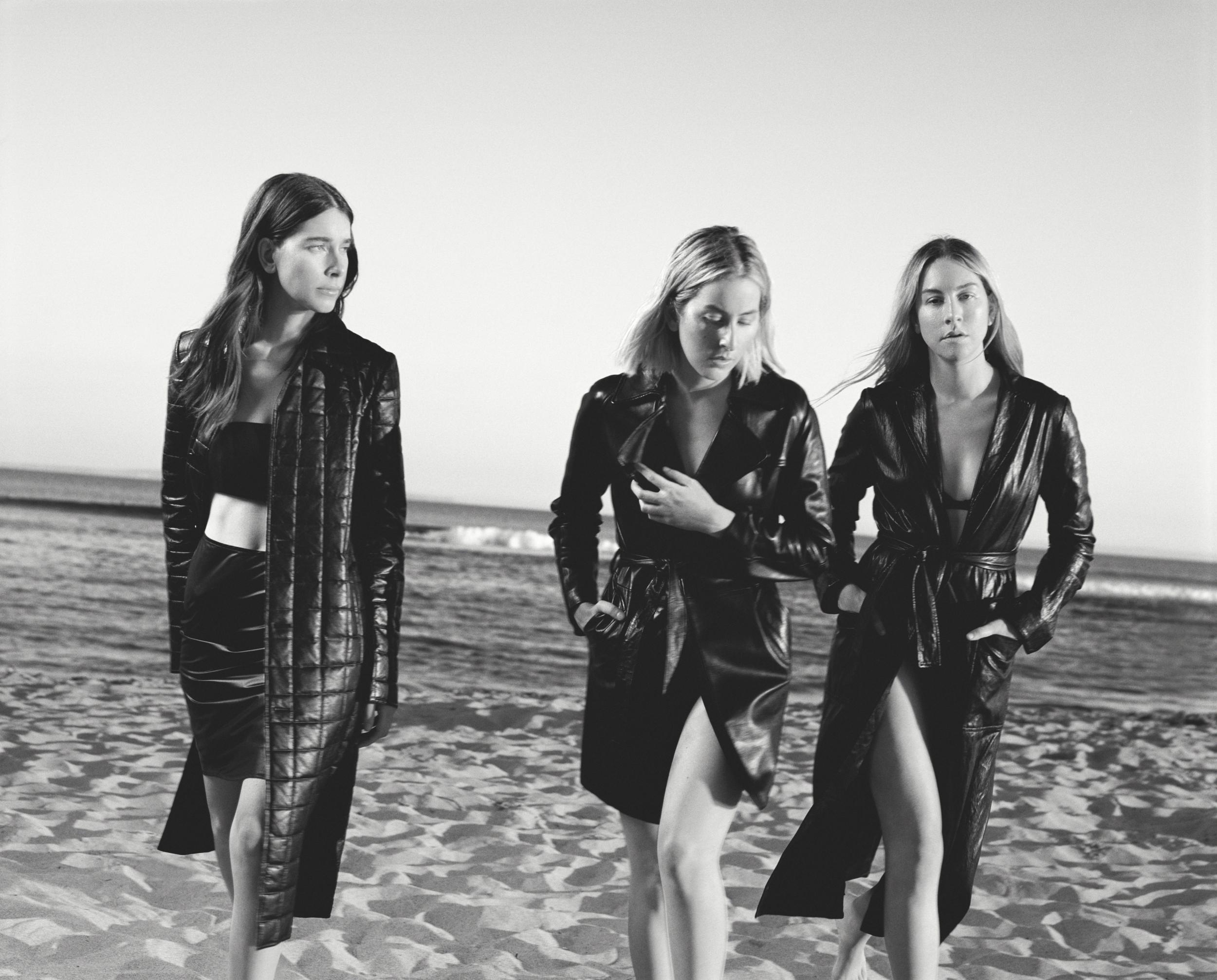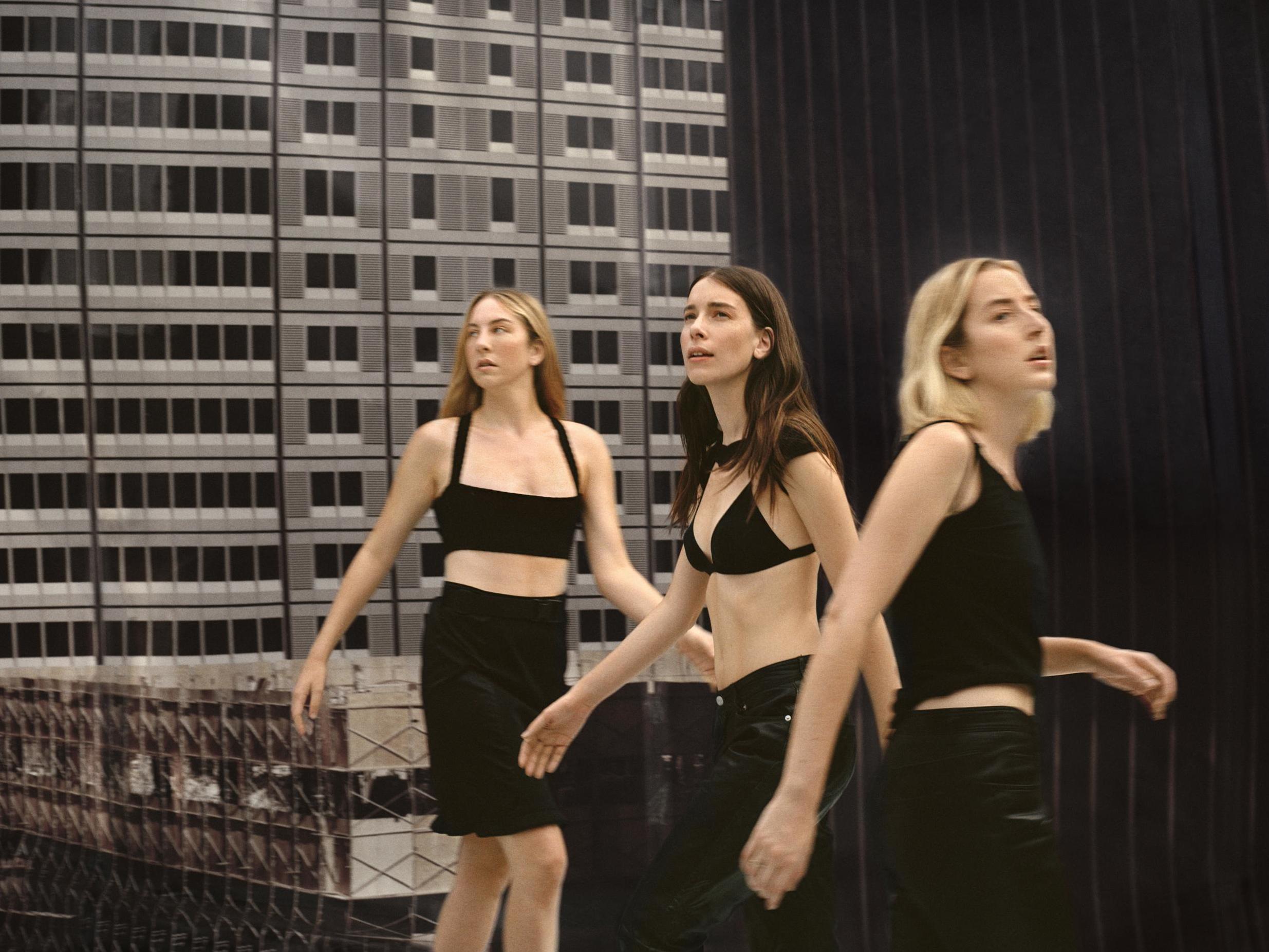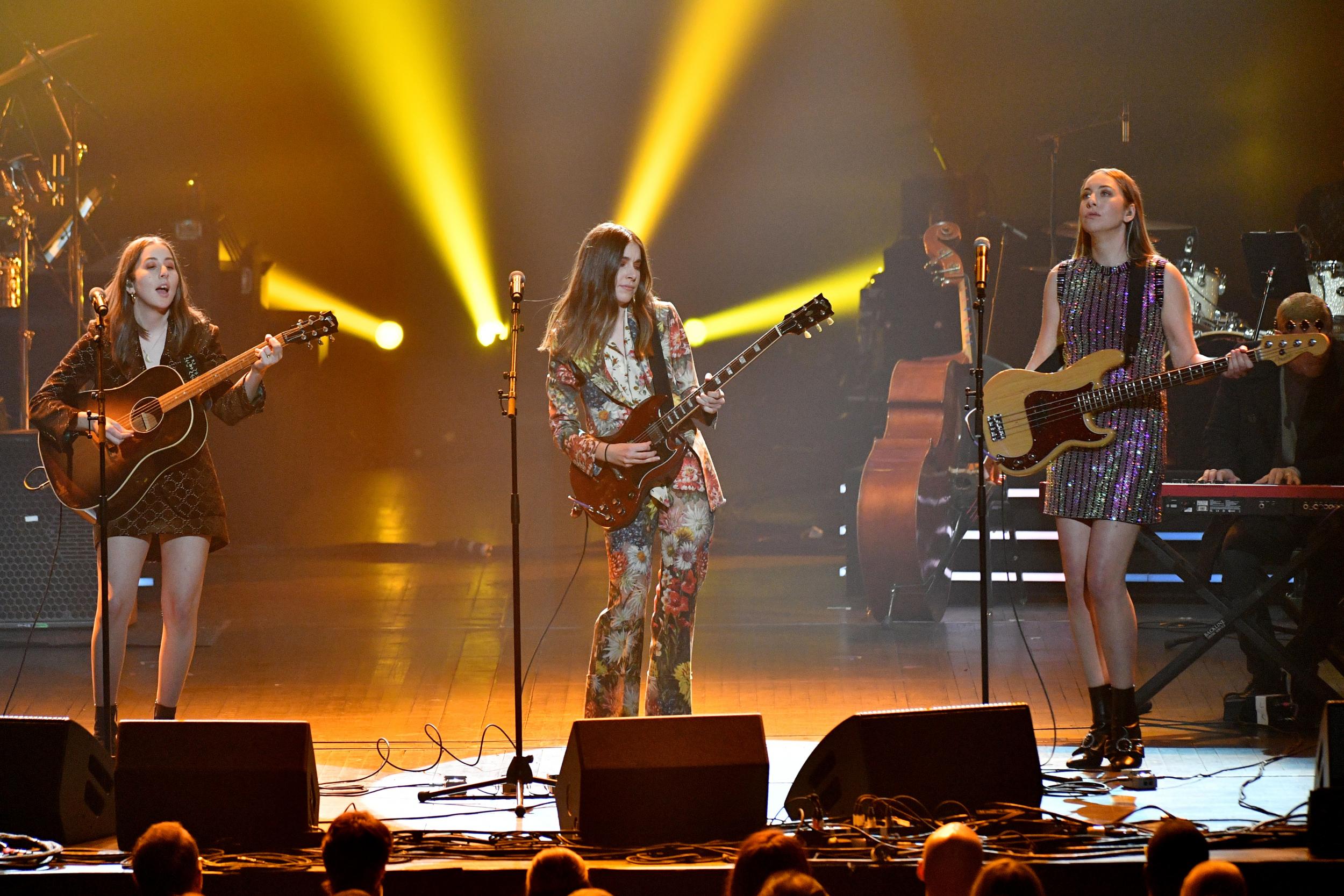Haim: ‘Men were like, “Get her off the stage, why is she making those faces?”’
The sisters talk to Alexandra Pollard about their new album ‘Women in Music Part III’, dealing with misogyny and depression, and why they don’t care if you like their album


Your support helps us to tell the story
From reproductive rights to climate change to Big Tech, The Independent is on the ground when the story is developing. Whether it's investigating the financials of Elon Musk's pro-Trump PAC or producing our latest documentary, 'The A Word', which shines a light on the American women fighting for reproductive rights, we know how important it is to parse out the facts from the messaging.
At such a critical moment in US history, we need reporters on the ground. Your donation allows us to keep sending journalists to speak to both sides of the story.
The Independent is trusted by Americans across the entire political spectrum. And unlike many other quality news outlets, we choose not to lock Americans out of our reporting and analysis with paywalls. We believe quality journalism should be available to everyone, paid for by those who can afford it.
Your support makes all the difference.I don’t know if you’ve ever been called a c***,” says Danielle Haim, leaning towards me past her sister Alana, “but it’s intense. I’ve been called it after I stuck up for myself in this business for feeling like something was not right. A lot of women have been called it.” She sighs. “Yeah.”
Haim have been dealing with microaggressions, macroaggressions and everything in between for nearly a decade now. Having grown up in a musical family – as children, they even played in a cover band called Rockinhaim with their parents – Alana (guitars, keyboard and vocals), Este (bass and vocals) and Danielle (lead vocals, guitar) formed Haim in 2007. But it wasn’t until 2012, after Danielle was asked to go on tour with The Strokes’ Julian Casablancas, that they realised they had real-deal potential and honed their California-hued guitar sound. A record deal with Polydor soon followed. So, too, did a management deal with Jay-Z’s Roc Nation. By the end of 2013, they had released their debut album, Days Are Gone, an enticing hybrid of pop, classic rock and contemporary R&B, which earned them a Grammy nomination for Best New Artist and the top spot on the BBC’s Sound of 2013 list.
And yet they still found themselves underestimated – accused of not writing their own material, asked patronising questions by male rock journalists and struggling to get played on rock-leaning radio stations because they were deemed “too pop” (read: too female). The pattern continued with their follow-up, 2017’s Something to Tell You. On their third, the smirkingly named Women in Music Pt III, they have decided to tackle it head on. So head on, in fact, they’re practically charging at it. “We named our album that because we didn’t want to get asked any dumb questions,” says Danielle. Noted.
The band are Zooming me from LA; Danielle and Alana are next to each other, both dressed down in hoodies, their hair scraped back. Este is calling from elsewhere in LA, isolating even more rigorously than her sisters because – as a type-1 diabetic – she is in the at-risk category for coronavirus. Except for Black Lives Matter protests (“We needed to be there”), none of them has left the house much since lockdown began. “I hear that it’s easing,” says Alana, “but I’m so neurotic in general that the thought of being in a restaurant…” “Honestly when I heard that pubs were closed in England,” interrupts Este – they do a lot of that, but never seem to get annoyed with each other about it – “I was like, ‘How is anyone gonna survive?’” “I can only see half your face, Este,” chuckles Alana. “Let me get a pillow for my laptop,” says Este, disappearing for a moment. “Is this better?” “Noice,” says Alana, in an approximation of an English accent. We soldier on. I try to avoid dumb questions.
Women in Music Pt III is probably Haim’s best album. Awarded a five-star rave by this publication, it is as woozy and slinky as it is combative, a California melting pot of Seventies rock, funk and Calypso, with beguiling production, ferocious choruses and equally fiery lyrics. “Every day I wake up and make money for myself,” sings Danielle on funk-rock stomp “The Steps” – an allusion, perhaps, to when they fired their agent after finding out they were paid 10 times less than a male artist performing at the same festival as them. But it’s on “Man from the Magazine” – an infuriated ballad that abandons fancy instrumentals in favour of a fuzzy acoustic guitar – that the gloves really come off. “Man from the magazine, what did you say? ‘Do you make the same faces in bed?’ Hey man, what kind of question is that?” sings Danielle. “You expect me to deal with it ‘till I’m perfectly numb/ But you don’t know how it feels… to be the c***.”
“Do you make the same faces in bed” was a real question, by the way, asked to Este by a music journalist because of the expressive faces she pulls while playing bass. “I see men making faces on stage,” says Este, “and it’s a reaction from feeling the music. I made the mistake early on of looking at comments on live performances, which I don’t do anymore, and all these comments, mostly men, were like, ‘Urgh, ugly, grotesque, get her off the f***ing stage, why is she making those faces?’ I think some men have a problem with seeing a woman enjoying herself. That’s threatening to them.”
“They want us to be a rock band,” adds Alana, “and then Este has these faces where she expresses herself, and it’s like, ‘But no, you’re a woman, you should be more pretty. Why aren’t you being pretty?’ At the end of the day, you can’t even ask, ‘What do you want from me?’ because I don’t give a f***, but these comments are f***ing insane.” “It’s not like I’m going to change how I perform,” says Este, “because it’s the only time that I feel good. The only time that I feel happy is when I’m onstage playing the music that I wrote.”
It’s a surprisingly heavy admission. But this album is full of those – even if some of them are filtered through waves of hot Los Angeles air. “Summer Girl” might sound mellow, with its jazzy bass riff and syncopated swagger, but it was written about Danielle’s boyfriend Ariel Rechtshaid (also the band’s producer) being diagnosed with cancer: “The fears inside your heart as deep as gashes/ You walk beside me, not behind me/ Feel my unconditional love.”
When Rechtshaid was going through it, says Danielle, “I felt so uncomfortable talking about it – it wasn’t my story to tell”. But once “Summer Girl” came out, “it felt good for people to know where the song was coming from”. In the aftermath of her partner’s treatment, Danielle found herself consumed by depression – an experience chronicled in “I Know Alone”, which sounds like a poppy Arthur Russell B-side that’s been dunked underwater. She addresses it elsewhere, too, on tracks like the rumbling, bassy “I’ve Been Down”. But it took a while to get to that. For a while, the depression rendered Danielle creatively stagnant. It took her sisters – and then a therapist – to pull her out of it.
“I feel like Danielle was going through…” says Alana, before doing a sharp turn to face her sister. “I’m speaking for you and you’re sitting right next to me, it’s very weird.” “Go for it,” shrugs Danielle, the most laconic of the three. “I feel like Danielle didn’t really know what was happening, but for me and Este, it was so crystal clear that the gears weren’t turning – they were rusted. Sometimes asking for help is the hardest step, because you’re being so vulnerable in saying, ‘Hey, I can’t do this alone, can you help me?’ I think me and Este knew we had to step in and be like, ‘Dude, something is wrong.’”
After that, things got slowly easier. Danielle started going to therapy. And the band began writing together again – though they tried to limit how much they shared their problems with one another, because they have a tendency to spiral when they do. “Sometimes it’s OK to be like, ‘You know what, I’m going to talk about this with my therapist, I’m not going to share with the class,’” says Danielle with a smile. “We opened our journals,” says Alana of the lyric-writing process, “we were thumbing through, and there was a little bit of, ‘Put an asterisk on that, maybe save that for the hour you have with your doctor later, and then come back to me and tell me what he or she said. I’d like to know.’”

When it comes to asking for help, it is both a blessing and a curse that the sisters were raised to be “super independent”. “We like to think that we can take care of ourselves,” says Danielle. “We have a very long line of strong women in our family,” adds Alana. “Our mother, our grandmothers…” But their desire to be independent wasn’t just a product of their upbringing. “I think it was also enforced by being out in the world,” says Danielle, “and going to a guitar shop and the man at the guitar shop asks you if you’re looking for a guitar for your boyfriend.”
“It’s a tough business to be women in rock,” says Este. “You have to be strong.” It’s why they’ve made it their mission to bring up other women where they can. In 2018, they brought hip hop-pop virtuoso and flautist extraordinaire Lizzo on tour with them – now, she’s headlining arenas in her own right. “We are white women, we have white privilege, we benefit from white privilege,” says Danielle. “I think bringing Lizzo on tour, we were such big fans of hers, and we wanted to show our fans how amazing she was.”
By that point, Haim were playing enormous venues. But it was a slog to get there. And being in a male-dominated world meant having to work twice as hard to prove themselves worthy. The other day, Danielle happened upon an old performance of theirs at a rock festival, where they were playing like their lives depended on it. “We were out for f***ing blood,” she says. Este watched it too. “There was, like, fire coming out of my nose and ears. It was a very ‘rock’ festival, and we were going f***ing nuts. Feeling like you have to prove you can really shred is ingrained in us.”

Do they still feel like they have to prove themselves? “I think this album has kind of moved us forward,” says Alana. Realising that you can’t win can be strangely liberating. They’ve even given up trying to get played on rock radio stations, after wondering for a while if maybe they needed to add a few more shreds. “If we did all those f***ing things, we probably wouldn’t get played anyway, so why choose a f***ing losing battle?” says Alana. “I’m over it. It would be like, ‘We wish your record cover had the colour blue on it.’ It’s just a losing game, and I’m tired.”
They don’t sound tired. On Women in Music Pt III, having stopped trying to jump through hoops in order to be deemed “rock” enough, Haim sound liberated. Instead of superfluous guitar solos, there are industrial sound effects, scratchy violins, vocal distortions, organs, shoulder-rolling bass.
“I think you can hear it on this record that we really do not give a f***,” says Alana. “We made this record, if you like it, great, if you don’t like it, I don’t care. If you want to play it on the radio, great. If you don’t, I don’t care.” Her sisters are nodding. “This is our record. It’s our music. We refuse to fit in a box.”
‘Women in Music Pt III’ is out now
Join our commenting forum
Join thought-provoking conversations, follow other Independent readers and see their replies
Comments